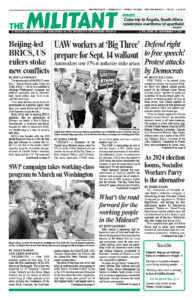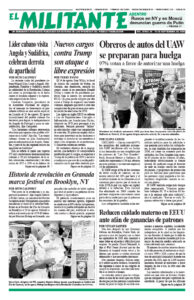September 14, 1998
DURBAN, South Africa — The 12th Summit of the Non-Aligned Movement, which includes 113 governments, mostly from semicolonial nations oppressed by imperialism, convened here Aug. 29.
Cuban president Fidel Castro arrived Sept. 1 to take part in the summit, which is expected to denounce the U.S. embargo against the Caribbean island. Following the meeting, the revolutionary leader will begin a state visit hosted by the South African government.
To millions of black South Africans and others who fought in the revolutionary democratic struggle against apartheid, the decisive role of Cuban troops in defeating South African invaders in Angola — and the contribution this made to apartheid’s demise — is well known. Also appreciated is the presence of about 300 Cuban volunteer doctors who are working in rural areas throughout this country.
September 14, 1973
The Justice Department is considering abolishing the infamous list of “subversive” organizations. The list dates back to a 1947 executive order by President Harry Truman, directing the Justice Department to draw up a list of organizations that were “totalitarian, fascist, communist or subversive.”
The Socialist Workers Party appeared on the original list and remains listed today. A challenge to the constitutionality of the list is a major objective of the suit filed against [President] Nixon and other government officials this past July by the SWP and the Young Socialist Alliance.
This suit attacks violations of the rights of SWP members and supporters, including illegal wiretapping, burglary, surveillance, and job harassment by government agents. Elimination of the list would be an important victory in defense of political rights.
September 13, 1948
“The high point of my visit to the Twin Cities was the large turnout of packinghouse militants at the St. Paul meeting. I welcomed the opportunity to pay tribute to them for their heroic strike struggle against the profiteering meat trust,” Farrell Dobbs wrote.
“The packinghouse workers came to hear me speak both as the presidential candidate of the Socialist Workers Party and as a leader in the 1934 Minneapolis truck drivers strike. We quickly found a meeting of the minds on the need for militant union policy backed up by independent labor political action.
“I also talked with a group of railroad workers. They informed me that sentiment for independent labor political action is gaining momentum in the ranks of the rail unions.
“You may be sure there is going to be a first-class SWP campaign in these parts.”

